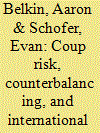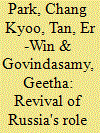| Srl | Item |
| 1 |
ID:
069871


|
|
|
|
|
| Publication |
2005.
|
| Summary/Abstract |
Contrary to the literature on rallies-around-the-flag, this article argues that, in some circumstances, leaders may use international conflict to promote domestic divisiveness. More specifically, the threat of a military coup generally prompts leaders to divide their militaries (a practice known as counterbalancing), and even to engage in international conflict to ensure that various branches of their own armed forces remain distrustful of one another. Two empirical tests of these claims are offered: a large-N statistical analysis that examines whether coup risk leads to counterbalancing, and whether counterbalanced nations engage in more low-level military conflict (controlling for other causes of conflict); and a case study of Georgia shortly after the dissolution of the Soviet Union. Both empirical studies support the arguments advanced by the authors.
|
|
|
|
|
|
|
|
|
|
|
|
|
|
|
|
| 2 |
ID:
118418


|
|
|
|
|
| Publication |
2013.
|
| Summary/Abstract |
The death of North Korean leader Kim Jong-il in 2011 presents Russian president Vladimir Putin with an opportunity to regain influence on the Korean peninsula. Over the long term, Russia may reemerge as a great power in the Asia Pacific region in line with Russian geostrategic interests. Since the collapse of the Soviet Union, Russia has been marginalized on major issues in Northeast Asia. The prospect of a consistent, long-term North Korea policy under Putin places Moscow in a strong position to sustain the process of engagement with North Korea. More significantly, it serves Moscow's demographic, economic, and security interests to be a positive influence in the region in order to regain a diplomatic role in any security initiatives concerning the Korean peninsula. In this article, we argue that if and when the Russian Far East is developed, Moscow would be in a position to offset the regional strategic and economic dominance of the United States and China.
|
|
|
|
|
|
|
|
|
|
|
|
|
|
|
|